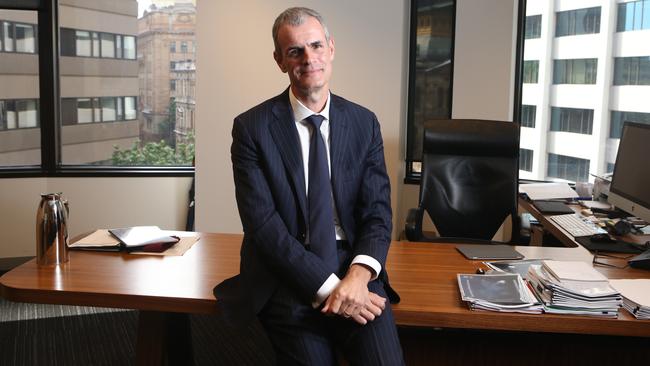Elmer Funke Kupper says it’s too early to buy back in to stocks
Elmer Funke Kupper is entirely unconvinced by the pundits declaring now is the time to activate dormant share portfolios.

Elmer Funke Kupper is entirely unconvinced by the market pundits who have cautiously crept outside their bunkers to declare that now is the time to activate dormant share portfolios.
The former Australian Securities Exchange chief executive said only two weeks ago, when the market had corrected by 15-20 per cent and toilet paper hoarding had just become a thing, that genuine buying opportunities were likely to emerge in May.
On Tuesday, however, there was a run of confounding events.
Astonishingly, the market closed higher, and a few analysts sprinkled the battleground with buy recommendations, including a courageous “buy” on the banking sector from Citi.
The obvious question was whether Mr Funke Kupper had signed up for the program.
“If you buy today, you have to be willing to do one, or both, of two things — sit tight as the market falls further, or buy more on the way down,” he told The Australian. “I struggle with the notion that the market has bottomed because you really don’t know; there are no facts to suggest it’s true. From last weekend, you could get a further 20-30 per cent decline — in fact, we got another 5 per cent fall on Monday.
“I haven’t changed my thinking from two weeks ago when I said wait until May because the balance between the upside and the downside will be clearer.”
The Citi report slapped a buy recommendation on the banking sector after a catastrophic 40 per cent plunge in share prices since early last month.
Analyst Brendan Sproules said the coronavirus pandemic was very different to other market and credit events, with the economy hit by worker and customer absenteeism and a supply-side crunch.
The major banks, however, were “much better prepared” for an economic shock compared to the 2007 global financial crisis.

“The key difference heading into the current COVID-19 event is the preparedness of the banking sector’s balance sheets for a severe crisis,” Mr Sproules said.
The level of common-equity tier-one capital had doubled, the sector’s reliance on offshore and domestic wholesale funding had fallen considerably, and the government and the Reserve Bank had unleashed “unprecedented” stimulus to mitigate the impact on the economy.
The response had also been significantly faster and more targeted to the emerging issues compared to 2007, with $190bn of stimulus announced for households and SMEs.
“Looking ahead, the combination of a strong demand for lending, and a lack of available funding outside the banking system, as well as the prospect of a large number of defaults, will all combine to drive asset spreads wider and net interest margins higher,” Mr Sproules said.
While credit provisions would rise dramatically in the initial phase, credit quality would remain unclear until the economy started to recover.
Ultimately, credit losses would be lower than the GFC because the virus would hurt people-orientated, service-based industries with lower debt levels.
Under Citi’s base case, major-bank cash earnings would fall 11 per cent in the 2020 financial year, 4 per cent in 2021, and then lift 17 per cent in 2022.
Dividends were likely to be cut by 10-18 per cent, starting in August with Commonwealth Bank, followed by the three other majors in November.
JPMorgan was more aligned with Mr Funke Kupper’s view, saying global markets had yet to fully price in a recession, despite a 30 per cent plunge from their recent peak.
While the average drawdown in the 10 recessions since 1948 was 28 per cent, the investment bank said the comparable figure for the last two in 2001 and 2008 was 50 per cent.
Mr Funke Kupper said his investment portfolio had a very small equities component, having the view some time ago that equities were overvalued.
As markets have plunged in recent weeks, his underlying approach has been that panics have always been overdone, and that the current malaise would be temporary.
Timing of any return to the market was always critical.
Two weeks ago, Mr Funke Kupper commented presciently that Westpac at $20 a share might look inexpensive but it was impossible to say so conclusively amid a widespread panic.
In the current environment, he said, price-earnings ratios (share price divided by earnings per share) and price-to-book ratios were simplistic valuation tools.
“The world will get over this and good companies will recover,” Mr Funke Kupper said.
“Things will move very, very quickly when there is a confirmed vaccine.
“But I’m sticking with the second half of May — by then we should know how the markets have responded to central bank and government interventions.
“Any advice on buying or selling before then is in a world of extreme uncertainty.”



To join the conversation, please log in. Don't have an account? Register
Join the conversation, you are commenting as Logout